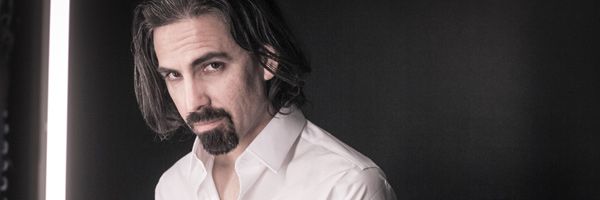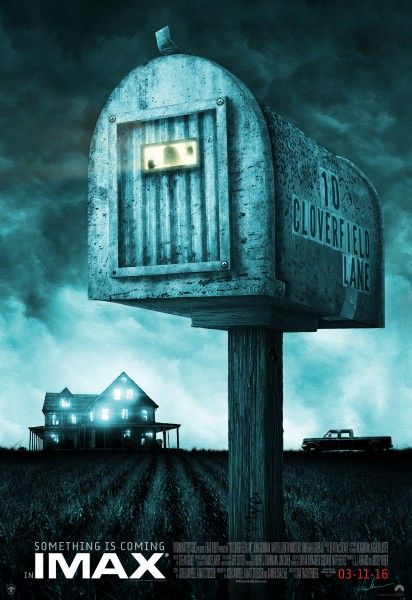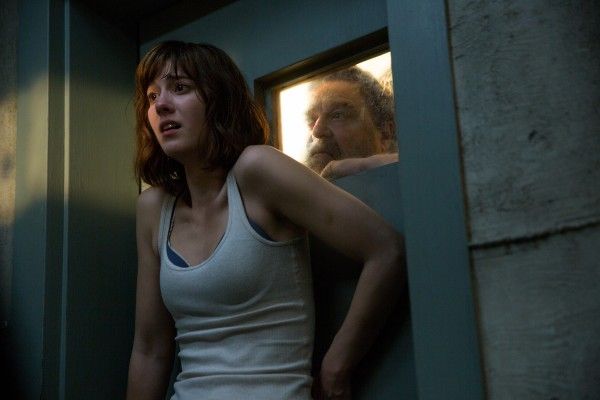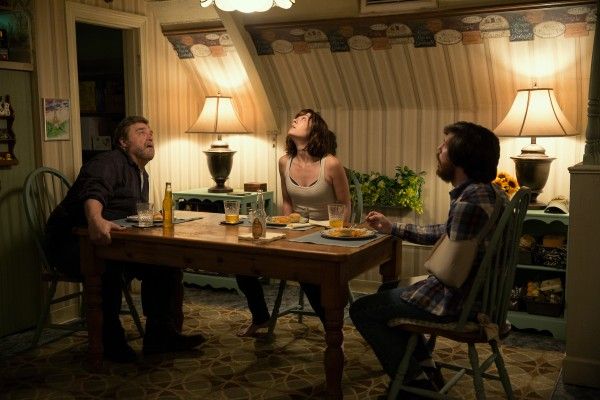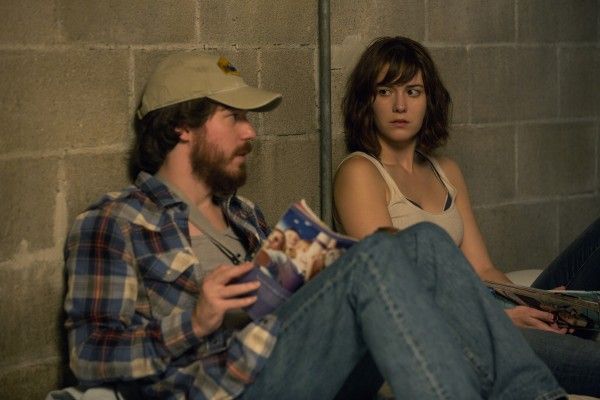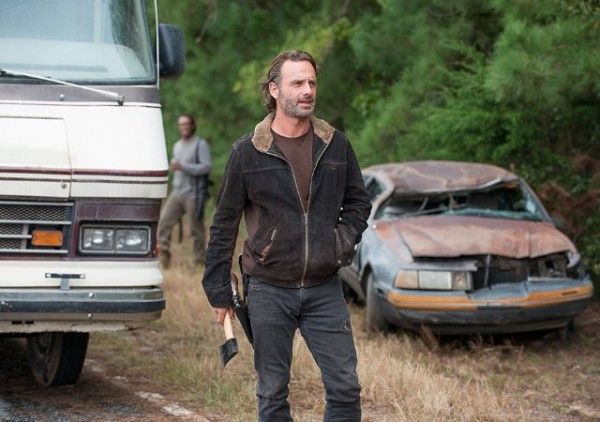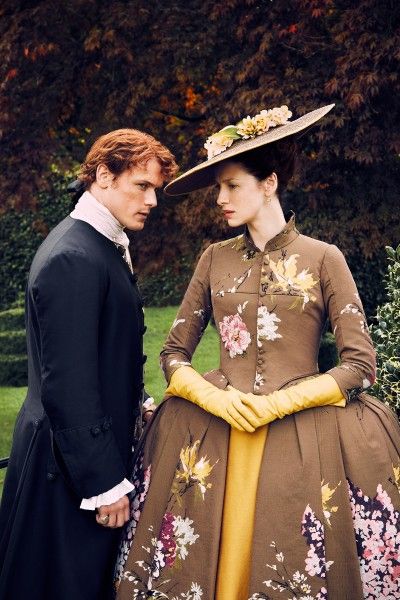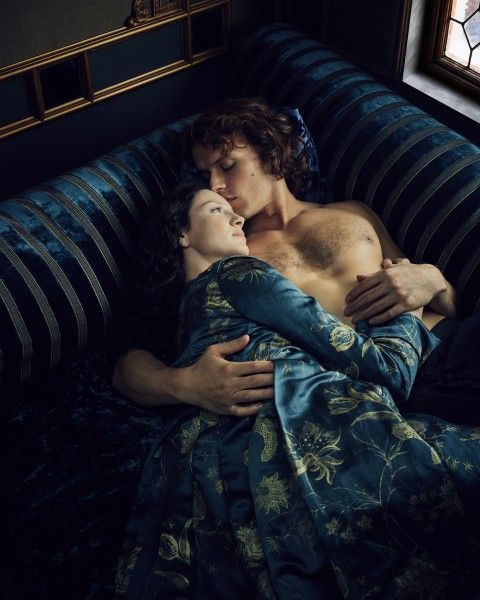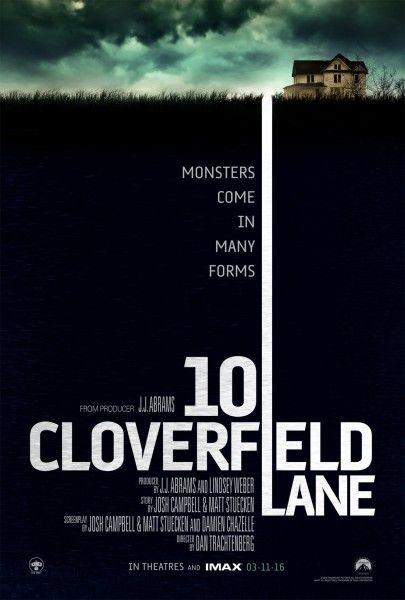If you’re not immediately familiar with the name Bear McCreary, I guarantee you’ve heard his work. The prolific composer’s resume is as impressive as it is long, ranging from Battlestar Galactica to Agents of S.H.I.E.L.D. to Da Vinci’s Demons, not to mention his unforgettable work on The Walking Dead, Outlander, Black Sails, and the short-lived Constantine. It’s a wonder the guy has the time to juggle all of these TV series at once, and that’s before you factor in his feature film work, with his latest foray into the big screen world marking his most high-profile project to date.
Given his genre-heavy resume, it’s little surprise that McCreary was chosen to compose the score for the J.J. Abrams-produced, highly secretive and now highly anticipated 10 Cloverfield Lane, which opens in theaters on March 11th. Directed by Dan Trachtenberg, the film stars Mary Elizabeth Winstead as a woman who wakes up in a bomb shelter with two men (John Goodman and John Gallagher Jr.) claiming to have saved her from an unknown menace outside.
As a fan of McCreary’s work and as someone who’s incredibly curious about 10 Cloverfield Lane, I jumped at the chance to interview the composer. Our wide-ranging conversation touched on how he became involved with the film, when it became a Cloverfield movie and how that changed his creative vision for the music, Abrams’ involvement and input in the creative process, drawing from classic sci-fi scores of the 60s and 70s, and using an instrument called a blaster beam, which is as cool as it sounds.
We also talked extensively about McCreary’s process and work in television, including how he juggles so many projects at once, the experience of changing showrunners on The Walking Dead, getting to use Jerry Goldsmith’s classic The Omen theme on the upcoming Damien, reinventing the style of Outlander for the second season, and more. If you’re at all interested in the art of film or television composing, McCreary offers fascinating insight into what it’s really like to craft music for a movie or TV show.
Check out the full interview below.
When you first signed on to this project, was it still just a secretive little sci-fi project. Did you know it was 10 Cloverfield Lane?
BEAR MCCREARY: At the time I didn’t know it was 10 Cloverfield Lane. I was sent a script a good while ago, a year and a half ago now and I read it and I couldn’t put it down. I mean, I think I called my mom at 1:30 in the morning because I was so excited because it was just an absolute page-turner, just a gripping thriller. I, of course, love J.J. [Abrams’] work and the director Dan Trachtenberg worked on this film Portal: No Escape, which I really, really like and I loved those Portal video games, and so that film had already caught my eye. And the notion that all these people were working together on a script like this and they wanted me do it was amazing. And for about a year and a half, I was sketching, I was visiting the set, I had a lot of creative discussions and it was all really low-key. The film was coming together and it really was at the very end of the process when J.J. got more involved. He definitely had a little project of his own and was distracted, perhaps. [laughs] I presume he slept for a couple of nights after Star Wars and started working on this movie. And then it started moving a lot faster and then around that time I found out what the true name and what the true nature of it was and that was very exciting it was very exhilarating. In fact, even though I had been on the film for a year and a half, maybe a little bit more, I ultimately bit off the lion’s share of my creative work really towards the end of the process. There was a 6 week process of really getting in the room with J.J. and Dan getting a sense of what the film really is.
So did finding out that it was a part of this Cloverfield universe cause you to kind of alter some of the ideas that you already had in place?
MCCREARY: It did. I would say that it did because that film is very intimate. It is physically intimate, it’s a very contained environment. It’s very tense, and even from reading it I always envisioned a score that was very tight and close, claustrophobic. And while elements of that absolutely remain, understanding that it is potentially a part of a broader cinematic universe brought with it ramifications musically that we should communicate a bigger sense, it just made the score bigger. And as J.J. got more and more involved, where his taste lies, where his experience on his last three films lie, it definitely pushed the needle in a much more cinematic direction. Which was really exciting for me because that’s definitely what my background is and what my experience is and what was cool was being able to combine that with all of the other ideas that I had generated. I didn’t throw anything out. I just combined the raw intimate, claustrophobic, edgy, dark sound that I had been imagining with a much bigger orchestral palette, and the end result is this really unique mix that could have only come about in this way.
Did the film change that much once J.J. came in? Were new scenes added or was the overall tone changed once he became involved and it began to evolve into more of a Cloverfield film?
MCCREARY: The tone definitely evolved. I remember distinctly one cue in particular in the beginning of the film in the first act where there is a long cue of propulsive energy and a lot of really cool sounds, percussion sounds. I used a thing called a blaster beam which is a bizarro instrument that is most famous for being used in Star Trek: The Motion Picture and other interesting sounds and J.J. responded to the energy, to the tension the propulsion. But he also wanted more of an orchestral presence. That was the cue where we really crystalized what his vision was, which was a more orchestral sound but we kept it in that very modern, propulsive, percussion kind of sound. It was interesting writing the cue in one style and then keeping everything they’re saying musically, but adding in instruments that are almost the opposite of what that style is and trying to preserve it. It was very cool. It was a really neat experience for me and J.J. really loved the new version, once we got back in the room and I played him the new take on it. I think we really found the soul of the score. I think we found that sound pretty quickly.
What were some of your conversations with J.J. and Dan like? Were there other influences impacting the score?
MCCREARY: Yeah. Well with both those guys, I felt like when I met them, within five minutes of talking with them, I felt like I had known them my whole life. They both are so well versed in film music, they are so easy to geek out with. I was talking with Dan Trachtenberg and within five minutes he is talking about Ennio Morricone and Carter Burwell. Not to say he likes their score, but able to articulate why he liked their scores because they take sounds that you wouldn’t expect in a genre then put them in the genre. I thought that for filmmakers, that was a really precise observation, it’s the kind of thing I spent an entire musical career thinking about and trying to articulate. J.J., within the first three minutes of meeting him he was talking about Jerry Goldsmith’s synths in the 80’s and Bernard Herrmann’s exotic orchestral colors and I just couldn’t believe what I was hearing. I mean what I love more than anything is Jerry Goldsmith’s 80’s music and Bernard Herrmann’s genre music from the 50’s and 60’s. I just kept thinking, I had this internal monologue running with myself, “I can’t believe this guy is saying this.” I don’t know if he even understands how much this is engrained in my DNA that is what I grew up with. It was really fun and getting to talk with those guys, it was very inspiring.
How would you describe the overall score? You said it became more propulsive once it became Cloverfield, how would you describe how it turned out?
MCCREARY: It’s difficult to describe the score but I would say it draws from science fiction and thriller scores from the 1960’s and 70’s. Bernard Herrmann, his work with Hitchcock, Jerry Goldsmith’s, Planet of The Apes, his Alien, even Logan’s Run, there is definitely a big orchestral slightly old school approach combined with what is one of the most modern scores I have ever written. I used a middle eastern instrument called the yayli tanbur, these are featured very prominently and the first thing you hear is the yayli tambur in every single cue in the film it’s almost constant. I recorded tons of custom percussion, we rented a giant warehouse we just bashed on cans and barrels and cinderblocks, broke glass and hit machinery and made sounds that were evocative of the bunker itself and the end result is underneath what I think is a very exciting orchestral score there is enough sound there to be a very interesting synth score on it’s own and a weird electro acoustic score and it’s all jammed together in a way that is unique. I am really very proud of it. It doesn’t sound like anything I have ever done before.
Sounds great, I mean all you need to say is Jerry Goldsmith and Planet of The Apes and you’ve got a lot of people there.
MCCREARY: [Laughs] Yeah well, I am not saying it as good a score as that. I’m just saying that’s what I was thinking about and drawing from.
Cloverfield famously only had one piece of original music which was Michael Giacchino’s fantastic “Roar.” Is there any nod to that in there or --
MCCREARY: There can’t be because I never heard it. I remember when I saw Cloverfield I was so motion sick, I had to like jump out, I had to see how it ended, so I never actually stayed for the whole credits and I’ve never seen it on DVD so no, there is no nod or anything to that. But I definitely want to check it out again.
That’s funny. Well obviously, your resume is extensive with plenty of television work, I’m very excited to talk to you because I’m curious and I’m sure a lot of people are curious about what the differences between working in television and composing for film. I mean just looking over your resume you’ve composed countless hours of music for TV, which seems insane --
MCCREARY: There’s a big difference right there. With television you are producing hours and hours of music and for film it is a shorter experience for both the audience and for you as a composer. I must say that creatively it is hard to pinpoint a difference because I approach projects the same way. I’ve always approached television from a little more cinematic perspective, if not a much more cinematic perspective because of the shows I have been fortunate enough to work on, so a show like Battlestar Galactica, The Walking Dead, Marvel’s Agents of S.H.I.E.L D they need the big cinematic sound, they need big character themes, they need the wide orchestra and I got very good at doing that every week. I think that the big difference, though, really is the notion that you have one chance to say what you are going to say, and I feel that working on a film, especially one like 10 Cloverfield Lane, that increases the artistic pressure for me. When I am working on the first episode of a TV show, I definitely feel a different kind of pressure.
For example, when I wrote the first The Walking Dead scene I thought, “This better be good, because I have a feeling this show is going to last a while and I don’t want to get sick of it and I don’t want fans to get sick of it.” I could be writing something that people are going to be listening to a long time from now, I think that show will be on for decades, you know? So that’s one kind of pressure, but it’s one that I have gotten quite accustomed to. It’s one that allows you the idea that you can change and evolve and try out some ideas but you can also try something else. Season two, season three, you can kind of play around in this world and if you listen to my score for Da Vinci’s Demons, for example, I think my best work was in the third season. It took me a couple of years to wrap my head around that material and that theme. That’s the show I wish could keep going just so I could keep playing around in that world.
With Cloverfield I was very excited about everything that I’m doing. I mean I am writing for blaster beam, dude! But this is it, I have one story, I have one narrative experience and in a way it really heightened the pressure on me to say everything that I have to say and find an intelligent way to put it into one musical experience that will last for an hour and a half or however long the film is. Definitely for me that is the tricky part. It was a fun challenge.
With something like The Walking Dead, what’s the experience working with different showrunners as the show progresses, especially a show that’s gone on for that long? Does the creative process as these other producers come in and have different ideas or, as you said, you did your best work in Da Vinci’s Demons season three, so clearly you’re progressing as well, but I’m curious what that relationship is like.
MCCREARY: That’s very true. The showrunner relationship in television is what the director relationship in film, there’s really no more important relationship. So when you change showrunners, man, it’s like getting divorced and getting remarried, okay? Anything can happen. And certainly I never took that for granted. The Walking Dead changed showrunners two times, and you know, under tense circumstances in each case and in each time I was prepared to lose my job, for sure. And it’s happened before, a new showrunner takes over and they want to bring in their composer, and that’s totally fair. I would do the same, and in both cases, I was given a chance to adapt to their style and I think you can hear it in the evolution of the score. Working with Frank Darabont, there’s a very particular sound that I dialed into for those first six episodes. In season two, we started to explore different ideas, and then in the Scott Gimple era, he’s done the last three seasons, he’s got really unique ideas and I’m grateful he’s kept me on and helped me help him find his vision. It’s very much like taking on a new show. If I switch showrunners and I get to stay on the show, I approach it like it’s their show, and I’m here to write their music for them. Sometimes I find bringing in my old ideas is just detrimental. Like if a new showrunner says, “Well we should do this because it’s different” and it’s something I already did in season one, it doesn’t matter or I go, “That’s not what the show sounds like, it sounds like this,” even thinking that, I’m doing myself a disservice and I’m doing the show a disservice. So it’s been a really rewarding experience, getting the opportunity to work with three very different but very creative individuals on a show as exciting as The Walking Dead, it’s been great.
By my count, you’re composing for at least five active TV shows right now between Agents of S.H.I.E.L.D., The Walking Dead, Black Sails, Outlander, I know you have Damien coming up. How do you go about juggling all of these different shows and composing new music – I know they’re not all on the same time schedule, so luckily they’re not airing at the same time.
MCCREARY: Yeah, I have been very fortunate in that you know, I’m not doing all network shows or all cable shows, television has really become a year-round process in the way that it’s made. And with the exception of Agents of S.H.I.E.L.D., all of the shows that I’m working on are a limited number of episodes. Ranging from, I’ve done seasons as short as six episodes, Agents of S.H.I.E.L.D. is a tough one, 22 episodes. But that allows for me to be able to work on a manageable amount of projects at a time, I just never have any time off in a year. I haven’t had time off in – oh man, I don’t even want to think about the last time I had real time off. But I find their diversity inspiring, honestly. If I were doing five cop shows, I’d probably start struggling to find an identity for each one and struggling to find inspirations. But for shows as diverse as The Walking Dead and Agents of S.H.I.E.L.D., Outlander with gorgeous Scottish folk music backdrop and the raw, rugged, nasty hurdy-gurdy of Black Sails, with Damien you’re going to hear a lot of choral writing.
Damien is my love letter to Jerry Goldsmith. We’ve even had access and rights to use his Academy Award-winning score for The Omen in Damien, which is the primary reason I even did the show. That was my first question when I got the call, was “Can I use the Jerry Goldsmith material?” and [showrunner Glen Mazzara] went, “Yes,” and I was very excited by that. So I get very energized by those kinds of things, it’s kind of fun to be able to jump back and forth between those kinds of projects, I’m never doing the same thing for a long period of time. Which is exciting, I thrive in that environment.
What’s your process like for scoring an episode of TV? How long, roughly, does it take for a single episode?
MCCREARY: That’s an easy question to answer: however much time I have. So that ranges from five or six days—a typical turnaround on Agents of S.H.I.E.L.D. is a week—and on Outlander, months. Cable is really a different beast so that just allows me to put in as much creative energy as I possibly can. Interestingly, the second season of Outlander which debuts in a few weeks, the show shoots in Scotland but a big part of it takes place in Paris this season—they shot a lot of it I think in Prague and some other places—but because of that there were a lot of shots and certain scenes that needed to be shot somewhere other than their primary shooting basecamp in Scotland, and so all those shots got delayed until they went and shot them all at once. So I ended up with an early version of like half a season. sure there were scenes missing, but there was a lot of stuff that was good to go and I had months to do it. It was really great, especially because I knew nothing about Baroque French music and I’m quite the expert now [laughs]. I really had a lot of time to get into it and soak it in and work with some experts and learn all about how the music sounded and really completely reinvent the sound of the show. That’s the kind of thing if I had a week to do that first episode that gets to Paris, I couldn’t do it. I’m not a good enough musician to like completely master something in a couple of days and turn it around. So that’s interesting, it just depends on the project.
Yeah I was gonna ask if with Outlander changing locations for Season 2 you were changing up the musical style.
MCCREARY: Very much. I think it’s essentially a different show while they’re in Paris. The look of it’s different, the costumes are opulent, and I intensely researched the music of the time period. In fact one of the characters in the book who makes an appearance is the Count of St. Germain, and when he made his appearance I looked him up on Wikipedia because I thought, “This feels like a real guy,” and he is a historical figure who actually, among his many skills, was a composer and wrote music! And I actually had my music historian pull up some old music of his and I found a piece that I liked, so he wrote his own theme. The guy, when he’s on camera the music that’s being played is his theme that his character actually wrote in real life. Stuff like that you can only do on a lush period piece like this when you have the time to do the research. When we go to Versailles, the music that’s being played there is the definitive music for that place and that time period. I always like to think I build in historically accurate musical in-jokes that are so precise that like maybe there’s 7 or 8 people in the world watching the show that will sit up and go, “Oh my God the music being played is the right kind of music!” But for everybody else it still helps create a sense of authenticity. It just feels authentic and it helps that it actually is.
Have you worked on Negan’s theme yet for The Walking Dead?
MCCREARY: I don’t know what you’re talking about. Gonna have to take the fifth on that one, no comment [laughs].
10 Cloverfield Lane opens in theaters this Friday, March 11th.

